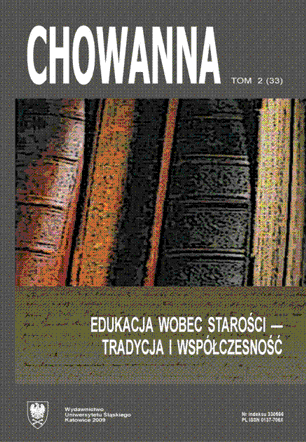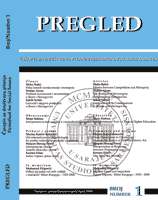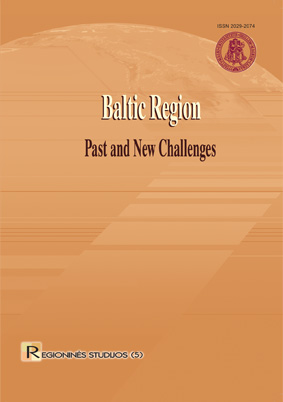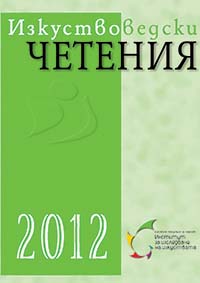We kindly inform you that, as long as the subject affiliation of our 300.000+ articles is in progress, you might get unsufficient or no results on your third level or second level search. In this case, please broaden your search criteria.





In memoriam to Momir Macanović (1938-2007)
More...
Most scholars argue that postmodern citizenship is a characteristic of young generations. Young people are not apathetic, but express an increasing rejection of institutional forms of participation. Post-transitional problems such as rising aspirations of economic well-being and persisting inequality led to decline of conventional and nonconventional participation in post-communist countries. The focus of this article is to investigate whether postmodern citizenship actually occurs in Lithuania. Based on a survey conducted in Lithuania in 2006, the article draws conclusions that postmodern citizenship occurs in Lithuania, but it does not confirm theoretical expectations. From theoretical perspective of the postmodern citizenship, the characteristics of identified groups (the traditional citizens, the monitorial citizens, the opportunistic citizens and the bold citizens) are mixed, because of socioeconomic and cultural conditions in Lithuania. Postmodernios pilietybės sampratos šalininkai teigia, kad narystės politinėse partijose ir profsąjungose, balsavimo, pasitikėjimo valdžios institucijomis mažėjimas gali būti paaiškinamas tuo, kad kinta tradicinės ir atsiranda naujų, spontaniškų, į konkrečių problemų sprendimą nukreiptų dalyvavimo formų. Kita vertus, demokratijos krizės teoretikai nurodo, kad pastaraisiais metais piliečių dalyvavimo sumažėjimas paskatino socialinio kapitalo nykimą ir atstovaujamosios demokratijos silpnėjimą. Šio straipsnio tikslas – nustatyti ir paaiškinti postmodernios pilietybės formų egzistavimą Lietuvoje. Ar Lietuvoje esama postmodernių piliečių? Kokie skirtumai išryškėja tarp postmodernių ir kitokių piliečių grupių? Kaip būtų galima paaiškinti šiuos skirtumus?
More...
The research presented in this volume shows that there exists a whole array of different opinions and interpretations related to the Baltic region; it even suggests some gloomy forecasts that this region is more a virtual construct than reality, and that the three Baltic states, Lithuania, Latvia, and Estonia, are gradually becoming more and more disparate. However, this volume also strongly suggests that we still have scholarly interests in and natural curiosity about one another. We hope that the articles published in this volume of Regional Studies titled Baltic Region: Past and New Challenges will inspire fruitful discussions, new enlightening research or at least some natural curiosity about what is happening around us.
More...
In the article two cases in Latvian and Lithuanian press are analyzed. First publication appeared in year 2000 Latvian magazine Kapitals, second in year 2004 in Lithuanian daily Respublika. Both articles claim that Jews rule the world. In Kapitals case publication is straightly entitled – “Jews rule the world”, Respublika case leaves some space for interpretation “Who rules the world?” from the texts it is clear that two groups are involved in the process, not only Jews, as in Latvian case, but also homosexuals. Because of negative stereotypes image of Jewish community in Latvia and in Lithuania has a lot of negative aspects and usage of negative stereotypes could provoke anti-Semitic attitudes. Homosexuals in Lithuania are one of the most stigmatized groups also usually referred only in negative connotations. Both publications are based on conspiracy theories that relatively small and in society unpopular groups in fact are very powerful and can strongly affect life of society. To publication in Latvia reacted not only civil society, foreign diplomats but Latvia’s Prime Minister and Minister of Foreign affairs condemning such a position, editor of the magazine resigned from his position. In Lithuania only civil society and foreign diplomats reacted, local politicians did not pay attention to the issues. Author of the articles (and owner of the newspaper as well) received some financial punishment without any adequate sanctions further. Straipsnyje analizuojami du antisemitizmą ir homofobiją skleidžiantys atvejai Latvijos ir Lietuvos periodikoje. Pirmoji publikacija pasirodė 2000 metų rugpjūčio mėnesio Latvijos žurnale „Kapitals“, antroji – 2004 metų keliuose vasario mėnesio laikraščio „Respublika“ numeriuose. Abiejose publikacijose kalbama apie tai, kad žydai valdo pasaulį. „Kapitals“ publikacija taip ir vadinasi – „Žydai valdo pasaulį“, o „Respublikos“ pasirinktas pavadinimas suteikia interpretacijos galimybę – „Kas valdo pasaulį?“ Iš teksto aiškėja atsakymas, kad tai daro dvi grupės – ne tik žydai, kaip latviškos publikacijos atveju, bet ir homoseksualūs žmonės. Dėl įsišaknijusių stereotipų žydų tautinės grupės įvaizdis ir Latvijoje, ir Lietuvoje turi daug neigiamų atspalvių, ir bet koks stereotipų kartojimas gali sustiprinti ar išprovokuoti antisemitizmo proveržį. Homoseksualūs žmonės Lietuvoje yra viena labiausiai stigmatizuojamų grupių, taip pat dažnai apibūdinamų tik neigiamais stereotipais. Abi publikacijos grįstos sąmokslo teorijomis, kad sąlyginai mažos ir visuomenėje nepopuliarios grupės iš tiesų yra labai galingos ir įtakingos, slapčia veikiančios visuomenės gyvenimą. Publikacija Latvijoje sulaukė ne tik visuomenininkų, užsienio diplomatų, bet ir Latvijos ministro pirmininko bei užsienio reikalų ministro viešo pasmerkimo, o žurnalo redaktorius atsistatydino. Lietuvoje pasipiktinimą pareiškė tik visuomenininkai ir užsienio diplomatai, tačiau jokios rimtesnės vietinių politikų reakcijos nesulaukta.
More...
Vilnius, the capital of Lithuania, has been declared a European Capital of Culture in 2009, and this official nomination by European Union constitutes another public mark of the process that the Republic of Lithuania carried out from their independence from Soviet Union to their membership in the European Union. To manage all the events that were organized in 2006, the Vilnius municipality and Lithuanian ministry of culture established a public institution named “Vilnius – European Capital of Culture 2009”. At the base of the programme, there is the involvement of different social groups, artistic, cultural and, more in general, volunteer associations, media operators or simple citizens that, through projects, should develop shows, concerts, performances that can represent an official culture accepted as trait-d’union between the European union’s idea of common culture among all members and the specific need of representation of particular and unique culture, tied to a specific and unique identity, of the independent republic of Lithuania. From another point of view, the so called “civil society”, in this case all those social groups, associations, artists and citizens can develop several representations of culture or, more in general, several ways of thinking about national identity, that very often can cause some tension with the official institution. The needs, problems and ideas about culture can differ or be in contrast with the official representation given by the government or requested by the European Union. The expected participation of civil society (groups, associations, artists, citizens, etc.) is, at the same time, a resource and a critical point of the programme. The connection between official goal of representation of a specific idea of culture and the statement to do this through the projects proposed by different groups can create tension and underline the different levels of meanings inside an apparent clear and unequivocal affirmation of culture. Vilnius, Lietuvos sostinė, 2009 metais buvo paskelbtas Europos kultūros sostine, ir šis oficialus Europos Sąjungos pripažinimas yra dar vienas riboženklis Lietuvos Respublikai pereinant iš buvusios Tarybų Sąjungos į Europos Sąjungą. 2006 metais Vilniaus miesto savivaldybės ir Lietuvos kultūros ministerijos pastangomis buvo įkurta viešoji įstaiga „Vilnius – Europos kultūros sostinė 2009“, skirta koordinuoti renginių veiklai. Programos esmė – skirtingų socialinių grupių, meno, kultūros, savanoriškų organizacijų, žiniasklaidos atstovų bei eilinių piliečių bendradarbiavimas organizuojant renginius, koncertus, performansus. Šia veikla siekta pristatyti oficialiąją kultūrą, kuri yra tarsi lydinys, sukurtas iš bendros visoms Europos Sąjungos narėms kultūros ir konkrečios, specifinės kultūros, susijusios su unikalia nepriklausomos Lietuvos Respublikos tapatybe.
More...
Nowadays public relations activities have become topical in universities and the work of universities is not possible without PR any more. Over the years public relations activities have become more diverse and intensive. Special departments have been created. The number of people employed has increased as well. However, as it is stated in the article, not all universities’ PR occupies a significant place. PR enthusiasts still have to try to explain to the management strategically important meaning, applicability, necessity of public relations and their place in the organizational structure. The aim of the article is to analyze and explain the role of public relations as a management function at universities. It is stressed in the article that the place of PR in universities to a great extent depends on the rector and public relations head manager relationship. Mutual understanding, respect, trust and support provide the development and success in the field of public relations. Universities’ PR programs are defined in the article. It is explained why the working with these publics is important to create positive images of universities. The article offers an analysis of the theoretical literature and other sources as well as giving facts gained from detailed interviews with public relations practitioners and academicians from universities in Latvia. Pastaruoju metu viešieji ryšiai universitetams tapo svarbia veikla, ir jau neįmanoma įsivaizduoti universitetų darbo be jų. Kasmet ši veikla darėsi vis svarbesnė, buvo įkurti tam skirti padaliniai, daugėjo jų darbuotojų. Tačiau, kaip matyti iš šio straipsnio, dar ne visuose universitetuose viešiesiems ryšiams skiriama pakankamai dėmesio – kai kur dar tenka įrodinėti viešųjų ryšių svarbą ir šios srities darbuotojų vietą organizacinėje struktūroje. Šio straipsnio tikslas – išanalizuoti ir paaiškinti viešųjų ryšių vaidmenį kaip vieną iš universiteto valdymo funkcijų. Straipsnyje pabrėžiama, kad viešųjų ryšių svarba universitete labai priklauso nuo rektoriaus ir viešųjų ryšių padalinio vadovo santykių. Abipusis supratimas, pagarba, pasitikėjimas ir parama skatina viešųjų ryšių plėtrą ir sėkmę. Straipsnyje apibrėžiamos ir pristatomos universitetų viešųjų ryšių programos, aiškinama, kaip dirbant šioje sferoje galima sukurti teigiamą universiteto įvaizdį. Straipsnyje analizuojama teorinė literatūra, kiti šaltiniai, pateikiama originali informacija, gauta bendraujant su viešųjų ryšių specialistais, akademikais, dirbančiais Latvijos universitetuose.
More...
The political strategy of the Baltic countries played a paramount rule in the break up of the USSR. Moreover, it was above all the restoration of Baltic independence that finally gave real substance to the concept of Baltic regional identity, in so far as the re-emergence of independent Estonia, Latvia and Lithuania was the catalyst for the re-drawing of the security architecture of the entire Baltic region. That reality in turn demands a re-evaluation of the influence of so-called small states in the international system, as well as recognition yet again of the major contribution of the Baltic peoples in winning over European opinion to their cause.
More...
When the Polish-Lithuanian Commonwealth was created, at a first time as a personal union, this was the mere consequence of political interests. Nevertheless, it was able to develop into a multi-national body characterized by its singularity and respect of local and regional differences. Was it a perfect political system? It was not, but with some features of what can be called a proto-federalism, the Polish-Lithuanian Commonwealth is an interesting case-study for the modern rights of minorities, as well as peace studies through institutional-building. Therefore, the purpose of this paper is to present the more relevant aspects of the Commonwealth in order to understand its importance not only as an exception at its time, but as having the potential to be an example of peaceful cohabitation, tolerance and multiculturalism for modern Europe. Sukūrus bendrą Lietuvos ir Lenkijos valstybę, pirmiausia tai buvo asmenine unija susietos valstybės, turinčios bendrų politinių tikslų. Tačiau ši valstybė sugebėjo tapti daugiataute, gerbiančia vietinius ir religinius skirtumus. Ar tai buvo ideali politinė sistema? Ji tokia nebuvo, tačiau atsižvelgiant į tam tikras ypatybes, kurios gali būti pavadintos protofederalizmu, ši valstybė yra įdomus atvejo analizės pavyzdys tiriant modernias mažumų teises ir institucijų kūrimą. Šiame straipsnyje stengiamasi išryškinti svarbiausius Lietuvos ir Lenkijos valstybės bruožus, šalies išskirtinumą ir pateikti tai kaip galimą taikos, tolerancijos ir daugiakultūriškumo pavyzdį šių dienų Europai.
More...
The Russian populations of Estonia live mostly in north-eastern Estonia and the capital Tallinn. As the Russian-speakers represent 43 % of the city inhabitants, the situation is particular in Estonia: contacts between Estonians and Russians may be easier than elsewhere in the country. The statistical data show a concentration of those populations in several districts including the district of Lasnamäe, built during the Soviet period. However, new trends reveal that the proportion of Russians increases in recent years in districts which had been mainly Estonian. The decision of Russian families to live in individual houses, like in the district of Pirita implies that inter-ethnic contacts could be better. However, the example of the location of schools in Tallinn reveals that even if the families move to other places, the relations may remain the same between Estonians and Russians. However, the analysis of the recent local and national elections that the Russian populations are well integrated regarding political issues. The elections in October 2009 reinforced the relations between the Russian populations and the Center Party, led by Mayor of Tallinn Edgar Savisaar and the absence of Russian parties in Estonia. Finally, the integration in the Estonian political life is real since the Estonian parties struggled to gather votes from the Russian populations of Tallinn, which essential to claim victory. Rusų tautinė mažuma Estijoje daugiausia gyvena šiaurės rytuose ir sostinėje Taline. Rusiškai kalbantys Talino gyventojai sudaro 43 proc., todėl kontaktai tarp estų ir rusų čia yra dažnesni nei kitose šalies vietose. Statistiniai duomenys rodo, kad rusų tautinė mažuma yra susitelkusi tam tikrose Estijos dalyse, įskaitant ir Lasnamę, sukurtą sovietmečiu. Tačiau esama naujų tendencijų, kad pastaraisiais metais rusakalbių gyventojų daugėja estiškai kalbančiose vietovėse. Rusų šeimų sprendimas gyventi nuosavų namų kvartale (kaip Piritos atveju) liudija, kad etninių grupių kontaktai gali būti geresni. Tačiau mokyklų išsidėstymas Taline rodo, kad, net šeimoms persikėlus gyventi kitur, santykiai tarp estų ir rusų gali likti tokie patys. Vietinių ir nacionalinių rinkimų rezultatų analizė atskleidė, kad politikos srityje rusų tautinė mažuma yra gerai integravusis. 2009 metų spalio rinkimai atnaujino ryšius tarp rusų tautinės mažumos ir Centro partijos, vadovaujamos Talino mero Edgaro Savisaaro, ir parodė, kad Estijoje nėra rusų partijų. Tad rusų tautinės mažumos integracija politinėje sferoje yra gana pozityvi, kadangi rinkimų Taline metu estų partijos varžėsi dėl rusų balsų, būtinų pasiekti pergalei.
More...
Human rights process becomes a scientific fact for many scholars all over the world in our days. Human rights are studied from different scientific perspectives. Human rights have historical, sociological, anthropological, international and other, at first very strong legal, dimensions. It means that only multidisciplinary approach can be fruitfully used in human rights research. The acquaintance with natural law doctrine, their secularization in the seventeen century, equality, freedom or liberty ideas, the idea of reason is a basic condition for human rights process studies. Philosophical questions about human rights help to clarify key concepts and definitions and to justify moral arguments that support human rights, because the language of human rights is normative or ethical language. Very important level of human rights process and its research is the legal one. International human rights are now an integral part of public international law. For the political scientist community, which is engaged in human rights research, the most important is perspective of comparative politics. Comparison is a very fruitful way in both, empirical and normative human rights research fields. Differences in political ideologies, religions and the variety of historical events, that have made difficulties in secure general agreements, and to reach common norms of human rights all over the world can be explain by comparison. Comparing human rights practices is an essential tool for understanding sources of abuse and reform. Unfortunately, it is not the case of Lithuania. Legal and State (public authority) texts on human rights field are prevailed. Impartial academic human rights process research is at very shy beginning in Lithuania. The aim of this paper is to point out some peculiarities of human rights process in Lithuania and to show some gap in this process research. Šiuolaikinis žmogaus teisių procesas yra tapęs rimto mokslinio tyrinėjimo objektu. Žmogaus teisių įvairiapusis reiškinys yra tyrinėjamas iš filosofinės, istorinės, sociologinės, antropologinės, politologinės, teisinės ir tarptautinių santykių perspektyvų. Filosofinė perspektyva padeda atskleisti prigimtinės teisės doktrinos ir jos sekuliarizacijos reikšmę formuojantis laisvės ir lygybės idėjoms, kurios yra žmogaus teisių sampratos pamatas. Normatyvinė ir etinė žmogaus teisių „kalba“ turi filosofinį pagrindą. Labai svarbus yra teisinis žmogaus teisių tyrinėjimo aspektas, nes žmogaus teisės tapo tarptautinės viešosios teisės dalimi. Politologams, tyrinėjantiems žmogaus teisių procesą, svarbiausia yra lyginamoji perspektyva. Lyginimas labai svarbus ir empiriniam, ir normatyviniam žmogaus teisių tyrinėjimui. Politinių ideologijų, religiniai, istorinės patirties skirtumai, kurie yra pagrindinė kliūtis įgyvendinti žmogaus teises tarptautiniu mastu, atskleidžiami juos lyginant ir įvertinant jų poveikį ir reikšmę. Žmogaus teisių praktikos palyginimas leidžia suvokti jų pažeidinėjimo priežastis.
More...
The activity of vocal cords during speech production generates the basic fundamental frequency of the voice. Under the influence of any kind of stressors, the basic frequency features change. Hypoxia is a powerful stress factor. It causes a decline of the complete functional state of the organism. The aim of our research is to examine if there is any connection between the height of 1600m which is slightly hypoxic and the physical parameters of the basic frequency. The height of 1600m is generally called the threshold of reactions. At the height of 1600m and a bit higher, the first reaction of the organism to hypoxic conditions can be noticed. A group of subjects pronounced the vocals I, E, A, O and U at the heights of 400 and 1600 meters and we examined the changes in the contour, average frequency, intensity and the length of the fundamental frequency.The results show that there is an important effect of the 1600m height due to the fundamental voice frequency while pronouncing the vocals. Under these conditions, the distortion of the contour of the basic frequency occurs, the average value of the frequency is higher and the intensity and duration are reduced.
More...
Мр Милан СОВИЉ - Научна конференција: České, slovenské a československé dějiny 20. století VI. 22 - 23. března 2011, Hradec Králové, Česká republika - 177 Мр Милан СОВИЉ - Четврти научни скуп чешких балканолога, Праг, 5. април 2011. године - 178 Мр Милан СОВИЉ - Тромесечни студијски боравак у Братислави, Словачка република (1. 2. 2011 - 30. 4. 2011) - 180
More...